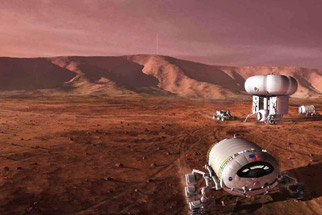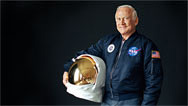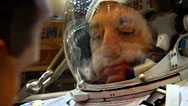The Psychology of Spaceflight
- By David Levin
- Posted 12.16.10
- NOVA scienceNOW
Long-term isolation is something that Al Holland deals with every day. Holland is a psychologist for NASA and supports astronauts who work on the International Space Station in six-month rotations. In this interview, he tells NOVA about some of the mental challenges a crew would face during a mission to Mars—a trip that could take more than three years to complete.
 Listen
Listen
NASA psychologist Al Holland says that a three-year return trip to Mars would be a mental challenge for any astronaut.
Transcript
The Psychology of Spaceflight
Posted December 16, 2010
DAVID LEVIN: You're listening to a NOVA podcast. I'm David Levin.
If you get cabin fever being stuck in the house for a day, just think what it might be like to be on a spacecraft headed to Mars. You'd be holed up in there for months, even years before you got back to Earth. Being in an enclosed space for that long would be tough for even the most well-adjusted person.
But that kind of long-term isolation is something that Al Holland deals with every day. He's a psychologist for NASA and supports astronauts who work in the International Space Station. He talked to us about the mental challenges crews would face on a flight to Mars.
DAVID LEVIN: So how do you mentally prepare an astronaut for a trip to Mars that could take years?
AL HOLLAND: Yeah. In fact, if we just go for a look-see, you're looking at probably a three-year mission. And that requires some special people. So you start with selection. And we have a pretty elaborate selection process right now, from the psychological point of view. And that process involves psychiatric screening, interviewing, psychological interviewing, looking at not only whether the person meets minimum criteria from a psychiatric point of view, but also whether they are suited for a three-year mission with a very small group of people.
DAVID LEVIN: When you're choosing a crew, experience in extreme isolation probably helps, but what are some of the other qualities that you're looking for in a person?
AL HOLLAND: We're looking for people who have the ability to modulate their emotions and watch what they say over time. And even when there's friction in the group, they're able to handle that appropriately and absorb some slings and arrows. And we're also looking for people with good teamwork skills, people who can be leaders, if necessary, or who can be equally good followers. And so, they're able to move between a leadership and followership role fluidly and maintain their social relations around them.
DAVID LEVIN: How would you handle any psychological problems that might come up on the way? By the time a crew gets to Mars, they won't be able to speak to a therapist very easily.
AL HOLLAND: Yeah. Well, first of all, you're going to have to solve most of your own problems. Our training will have to be focused on—not just in individual behavior, but in team behavior, team dynamics, conflict resolution, cultural issues, and cultural conflict resolution issues. More from a preventive point of view than a resolution point of view. So a strong preventive push on our part.
DAVID LEVIN: So if a more serious problem does come up, how do you deal with it?
AL HOLLAND: Then it would be done through a video letter, if you will, where a crew member would record something on the outbound craft, or the distant craft and then a person back here in the medical group or back at home would receive that video and they would listen to it, and then they would make their own response, and it would go back.
So we'll need the technology to put those together quickly, transmit them and receive them quickly on both ends.
DAVID LEVIN: Astronauts are already spending months at a time in space on the International Space Station—so how is that different from what they'd experience on the way to Mars?
AL HOLLAND: The International Space Station, or ISS as we call it, is typically a six-month mission. And that's not too much of a hardship for individuals because it's the very peak of its life span, as far as a vehicle goes. There's good communication, lots of spare parts and supplies, lots of room with six crew members.
But if we go to Mars, on the other hand, you're looking at -- even if you take a smaller crew, three or four people -- you're looking at a much smaller habitable volume, and you won't have real-time communication with your family. There'll be less amenities. And there'll be more, perhaps, social friction. It's a very different thing when you say a long ISS mission versus a long Mars mission.
DAVID LEVIN: It seems like on a trip to Mars, loneliness would be a big problem. If you have the same six people around you, that's one thing, but how do you keep from feeling cut off from the rest of the world when you're that far away?
AL HOLLAND: Yeah. Well, you can't prevent feeling cut off from the rest of the world, because you are cut off from the rest of the world. There will be some times of loneliness, and that's part of the difficulty of current long-duration flight to new places, is that you have this isolation, confinement, separation from your usual social supports. You've got potential boredom. There's a natural element of loneliness. So we need mature people who have already dealt with this, whether it's on submarines or it's in polar or sub-sea settings. It shouldn't be a first experience for them. And then we'll work with them to just hone their skills even more so that they're able to have strategies for overcoming that loneliness, and also to rely on the other teammates, team members and activities, work activities that are going on onboard, to break that feeling and to move on with the day.
DAVID LEVIN: So variety's pretty important, then, on a mission like this.
AL HOLLAND: Extremely important. It's extremely important currently. And we encourage crew members not just to work, because they tend to be strong workers, but also to have to encourage them to take time away from work and to celebrate holidays and celebrate small victories on board, and to otherwise play and to have a little time for fun.
DAVID LEVIN: E. O. Wilson, the famous biologist, talks a lot about biophilia, the idea that humans need the natural world inherently. And on Mars, you'd be in an environment that our species didn't even evolve in. So is there any planning towards helping astronauts cope with that? You can't exactly go for a walk in the woods on the surface of Mars.
AL HOLLAND: No, you can't. But it's much better to be on the surface of something than it is to be confined to a vehicle for months on end. So I think once they arrive at the surface, it's going to be a good day. And it'll be a welcome thing, and they'll be able to move about physically. And their line of sight will be much further; that is, the horizon will be much further. And that's healthy. And so, there will be some aspects of being on the Mars surface that are similar to being outdoors, even though you're in a suit.
In general, the environment of Mars is so caustic and hostile to our type of life that it'll be an artificial environment as the vehicle is; it's an artificial environment. In the vehicle, they artificially create a society, small society. And they will go through their three years of life there and all the things that that entails, and the ups and downs of that. And on the surface of Mars, it'll just be an extension to that, but a welcome one. I think they'll have mixed feelings about getting back into the vehicle to return home.
DAVID LEVIN: Other than training and monitoring the crews before and during the mission, is there anything else that might help them psychologically?
AL HOLLAND: Oh, Yeah. The psychological area, or the behavioral area, is greatly helped by advances in propulsion, believe it or not. It's sort of something you wouldn't think of, a strange bedfellow. But the extent to which propulsion technology moves forward so that they can actually get to Mars and back faster, that solves a lot of our life science psychological problems. So we are big fans of propulsion technology research. [laughs] And we understand that even though once they get a new engine or a new method of going, that they'll want to go farther. And that's fine, that's good. And we'll be face-to-face again with the same old human problems. But as far as going to Mars, breakthroughs in propulsion would be quite welcome.
DAVID LEVIN: Al, thanks so much for joining me. It's really been a pleasure talking with you.
AL HOLLAND: You bet, David. See you later.
Credits
Audio
- Produced by
- David Levin
Image
- (Mars lander computer rendering)
- Courtesy NASA
Related Links
-

A Mission To Mars
Former astronaut Buzz Aldrin says that a human presence on Mars is inevitable.
-

A One-Way Trip to Mars?
Initial shock aside, some space scientists argue this is the only way to go.
-

Back to the Moon
Hear David Morrison of NASA's Lunar Science Institute explain why we need to return to the moon.
-

Life of an Astronaut
In this video, veteran spacewalker Mike Massimino talks about the challenges of training to work in space.
You need the Flash Player plug-in to view this content.



